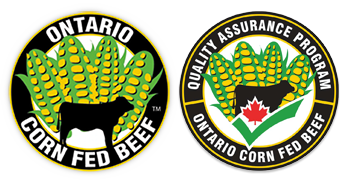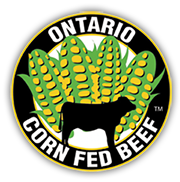“The News Feed Live” Webinar Series #3 – “Building A Financial Management Foundation”
Presented In Collaboration With Ontario Corn Fed Beef and Ontario Ministry of Agriculture, Food and Rural Affairs
Date: December 15, 2022
Time: 7 – 9pm
Download Presentations: (click each link below for PDF file)
Agenda
• 7 pm -Welcome to Webinar – James Byrne, OMAFRA, Beef Specialist
– Brent Cavell, OCFA, OCFB
• 7:05 pm -20 minutes – Stephen Duff, Chief Economist Ontario Ministry of Agriculture, Food and Rural Affairs, Guelph ON – Introduction by James Byrne
– Steve will discuss the Outlook on the grains and livestock markets going forward into 2023, from both the domestic and export perspective.
– Viewpoints of risk assessment levels and possible actions to be considered to capitalize or protect the upcoming marketing year.
– Financial markets are of particular interest currently and Steve will offer his analytical expertise in this area and discuss the “what if” scenarios that encompass this topic.
• 7:25 pm – 25 minutes – Melvin Steckle, our host farm, Melvin, Joanna and Family.
Introduction by Brent Cavell
• Melvin Steckle – Video of the cattle facilities, barns, feed storage, handling facilities, grain storage, seasonal retail greenhouses, seasonal retail farm market, and outbuildings. Steckle’s Produce & Flowers Website – www.steckles.ca
Melvin will describe his operation as narrative to the video (7minutes) including:
– A well-managed family run operation that pays attention to detail and maintains very clean surroundings
– He will talk about new innovations incorporated as cost savings on his farm, including soil structure improvement, fertility, crop rotation, minimum tillage, manure application and the importance of crop residue to his operation.
– Animal Health is taken very seriously by Melvin. He implements protocols resulting from pre-arrival discussions with his veterinarian and nutritionist
– Talks about the cattle and source, utilizing of barn space, renovations of old facilities, air quality, special treatment of incoming cattle, and area in the barn to accommodate the finishing cattle for separation from new arrivals. Receives 5 loads of new arrivals spaced out at 2wk intervals to reduce health risks.
– Explains the bunk silos, feed storage, covered to preserve quality, neat and tidy well-kept feed storage faces.
– A diversified family farm with a number of entities as part of their business model.
– Melvin is a certified Ontario Corn Fed Beef Program, Quality Assurance member and uses the OCFB required records to compliment his own extensive business records.
Further discussion points with Melvin and Brent- the remaining time post the video
– Explain how he manages risk on his farm – criteria he uses to “pull the trigger “
– Cattle production – current crop values, current and future cattle values, current nutrient values of manure, fertilizer values – what position is taken on these variables, …how do they influence management decisions… do the home-grown crop production values act as risk protection for possible lower cattle values? Etc.
– Discuss the management value of calculating cattle group closeouts and how do you use
this information.
– Corn stover and wrapping / storage costs – value recovered?
– Custom work – managing time vs farm responsibilities
– Financial contribution of the cattle to the operation in terms of real costs – having the 500 head of cattle on feed he markets annually, vs none on feed.
– List in order of importance, the most critical Standard Operating Procedures in beef production on your farm e.g., bunk management, tracking performance, etc.
– List the team members (e.g., banker, accountant, veterinarian, nutritionist, crop advisor etc.) that play an active role in your management decisions for your operation and how they add value to your decision making.
• 7:50 pm -20 minutes – Mike Bossy, Bossy Nagy Group, Chartered Professional Accountants, Tillsonburg ON – Introduction by Brent Cavell
– Outline an accountant’s role in business consulting/coaching for business owners in agriculture, adding value to the client’s business.
– The buckle-down for uncertain times ahead – be proactive, be prepared.
– Benefits of an accountant’s involvement in a client’s business throughout the year, not solely at tax time.
– Discussion surrounding the Bossy Nagy Groups expertise of analyzing their clients’ financial requirements, including business plan projections, cash flow calculations, budgeting for capital expenditures, tax implications and financial documents for a lender’s requirements.
• 8:10 pm -20 minutes – Amanda Hammell – Director Commercial Financial Services Finance, Agriculture | RBC Royal Bank – Introduction by James Byrne
– Amanda will discuss the areas of focus, she, as a lender, places on a client’s financial statement.
– Depending on the client’s situation, extensive emphasis is required on past performance records, benchmarks, risk management, effective management strategies and financial projections.
– A timely topic, interest rates, garners a discussion on the impact to your business and strategies to minimize the effect of those rising rates.
– Amanda will discuss the advantage of working with a team support group involved with the client’s business, and what that group of experts bring to the table.
– How does a lender interact with that collective information and viewpoints, in terms of adding value to the management skills of the client.
– Discuss the correlation between risk management and equity management in these uncertain financial times.
Panel Discussion
• Moderator of Panel Discussion is John Molenhuis, OMAFRA, Business Management Program
Lead – Introduction by James Byrne
• Reintroduction of panel participants by John Molenhuis
• Panelists- Melvin, Steve, Mike and Amanda
• 8:30 pm -30 minutes – John Molenhuis – fielding / directing questions from webinar attendees
– John will discuss a highlighted example he experienced (e.g., a client that had excellent records of past performance material used to greatly influence capital expenditures, cost savings etc.) with OMAFRA, setting the tone for an engaging discussion with the panelists.
– John will then give a short preamble on the discussion points that present themselves on Melvin’s video and narrative of his operation.
– John will then direct identifiable points toward the appropriate panelists for discussion.
– Discussion point of importance is – Producers need to have the team members of your farm business support/peer group in place to collectively evaluate your farms information data.
– Assembling a good team creates the opportunity for experts to observe the management style being implemented by the owners.
– Members of the team will offer experienced constructive suggestions, which enables producers to have confidence in making well informed management decisions on their farm.
• 9pm – Closing remarks – James Byrne and Brent Cavell

